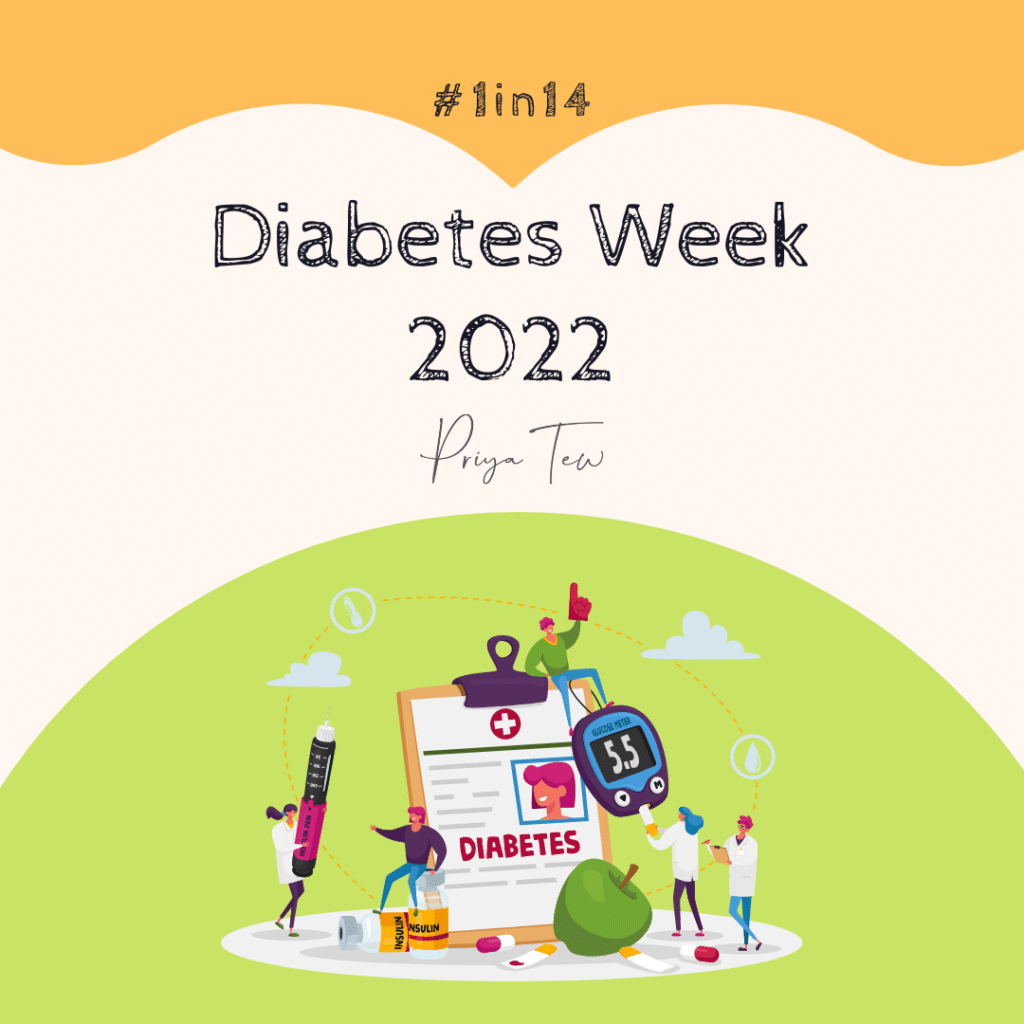Did you know 1 in 14 people have diabetes? That works out as 4.9 million people in the UK. Thanks to Elle Coales for her work on this blog all about diabetes as part of Diabetes Week 2022. For more resources about Diabetes please check out Diabetes UK.
Type 2 diabetes (T1DM)
The majority of diabetes cases are Type 2 diabetes at around 90%. Type 2 diabetes is driven by a combination of factors including family history, ethnicity, underlying health conditions and lifestyle factors. Here, blood glucose (sugar) levels can become raised. Over time, this can lead to insulin resistance, meaning that the “normal” amount of the hormone insulin has a smaller effect on reducing blood glucose levels. The pancreas may not be able to produce sufficient insulin to keep up with the amount needed to manage blood glucose levels within normal range.
Type 1 diabetes (T2DM)
In contrast, Type 1 diabetes occurs when the cells in the pancreas that produce insulin are destroyed so that the body is unable to make insulin. This is often diagnosed in childhood or in young adults, whereas Type 2 diabetes is more likely to be diagnosed later in life.
Gestational Diabetes (GD)
A type of diabetes that can occur in pregnancy. Whilst you can still have a perfectly happy and healthy baby, it is important to monitor blood sugars, diet and exercise during pregnancy and have the support of a health care professional so you can adjust your eating accordingly.
Tips for eating to support diabetes:
Eating well for Type 2 diabetes or prediabetes includes choosing foods that support managing blood glucose levels. Part of this can often involve carbohydrate awareness. Carbohydrates break down into sugar molecules, including glucose. You do not necessarily need to switch to a low carbohydrate diet for T2DM, but moderation, or at least awareness, of carbohydrate portions can help with blood glucose management.
Restricting carbohydrates too much can be unsustainable in the long run, so finding a diet that works for you long term is important. In addition, carbohydrates are the preferred fuel source of our bodies and our brains, and carbohydrate-containing foods can contain valuable nutrients and fibre.
Food for blood glucose management
Fibre can help blood sugar levels by slowing down digestion of food, so aim to include sources of this throughout the day. This includes:
- Fruit and vegetables, keeping the skin on where you can and sticking to one portion of fruit at a time. Top tip: Kiwi are particulary fibre rich, especially if you eat the skin, which is edible. 2 kiwi fruit with the skin on provides 5 g of fibre.
- Wholegrains including cereals, pasta, rice and bread, nuts and seeds. Go for the brown version of check the fibre on the food label. Top tip: Popcorn is also a wholegrain and you can pop it in the microwave.
- Beans and pulses, add to salads, pop into stir fries, makes a bean chilli or a dhal, add to casseroles or eat them roasted as a snack.
Unsaturated fats provide essential nutrients, and can also improve how satiating -and tasty -a meal is. Add avocado, nuts, seeds and olives to meals.
Protein is also good for improved blood sugar levels. It is filling, and can be very satisfying. Pairing protein with a less complex carbohydrate can help to slow absorption similar to fibre.
You may find it helpful to eat more regularly to manage blood glucose levels, perhaps every 3 hours or so. This might look like three meals with snacks in between, or even something closer to six small meals throughout the day.
Whether choosing snacks or main meals, aiming to include a source of fibre, protein or fat in your food can help with glucose management.

I was diagnosed as pre diabetic in late December 2021. I made small changes to my diet, for example, by reducing the amount of bread I ate, swapping old potatoes for sweet potatoes, introducing more vegetarian meals, now normally twice a week and increasing the number of times I have eggs of some sort for breakfast from three to four per week.
I had a blood test last week to measure my blood sugar levels (HbA1c) and my blood sugar is now normal – I am no longer pre diabetic and I have lost 8 kilos weight in the process. The only food I have completely eliminated is grapes, which I love and I can even still have my favourite plain Kettle crisps but once every three weeks instead of once a week.
Amazing to hear Robert!